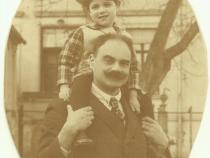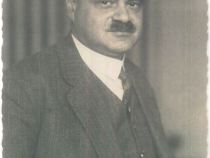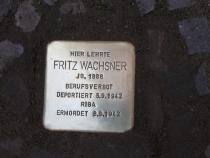Location
Erich-Weinert-Str. 70
District
Prenzlauer Berg
Stone was laid
27 November 2014
Born
03 July 1886 in Berlin
Occupation
Lehrer
Deportation
on 05 September 1942
to
Riga
Murdered
08 September 1942 in Riga
Fritz Wachsner was born in Berlin on July 3rd, 1886 as son of the merchant Siegfried Wachsner. He grew up in Berlin and took his final exams in 1906 at the Sophien-Gymnasium in the district of Mitte. In Berlin and Jena he studied pedagogics, philosophy, religion and natural sciences and also spent a couple of semesters at the University of Jewish Sciences. In 1910 he did his doctorate on the pedagogics of Berthold Otto and achieved his PhD. In 1911, Wachsner absolved his teaching qualification in physics, chemistry, mineralogy, botany and zoology. Early on, Fritz Wachsner was interested in reform pedagogics and studied this topic thoroughly. He published essays like one about hiking trips with pupils in which he developed ideas of how pupils could develop better and how teachers could do them better justice.
Fritz Wachsner became involved in Jewish organisations and was member of the Berlin Jewish Reform congregation, for whose newspaper he wrote articles. He was father of two. In 1915, Fritz Wachsner’s daughter Charlotte was born. His wife died in childbirth. Fritz Wachsner married a second time and his wife, Paula, gave birth to their son Ernst in 1919.
Fritz Wachsner had been admitted to the teaching service of Prussia in 1917 and started to work as a teacher at the Sophien-Gymnasium, followed by teaching at the Kirschner-highschool in Berlin. In Buckow in the province of Brandeburg, he then established an institution of higher education in form of a boarding school in two years. In October 1920 he went as head teacher to the Schinkel high school in the Berlin district of Prenzlauer Berg. The school was in the Carmen Sylva Street, now named Erich Weinert Street. The teaching staff appointed him to be the permanent vice-director of the school. In the 1920s, Fritz Wachsner lived in Stargader Street 65/66 in the district Prenzlauer Berg and then moved to Prenzlauer Allee with his family to the beginning of the 1930s. Between September 1930 and March 1931, Wachsner was the provisional director of the Schinkel high school. He was considered to be a popular and dedicated teacher who was able to make his pupils laugh.
A couple of weeks after the Nazis seized power, Fritz Wachsner lost his post as teacher of the Schinkel high school. The Nazis also deprived him of his doctoral degree. This injustice was annuled only in 1998 by the Humboldt University of Berlin. Fritz Wachsner moved to the district of Charlottenburg to Schaper Street 30. In 1935, he became founding director of the Jewish Joseph-Lehmann-School in Joachimsthaler Street. Besides this he had been teaching at a private school of chemistry of the Jewish Reform congregation since 1919.
Fritz Wachsner was deported together with his wife on September 5th, 1942 by the Gestapo to Riga. They were both murdered there. His son Ernst did not survive, either. Only his daughter Charlotte managed to flee to the USA under most difficult circumstances. Friends of Charlotte in Berlin saved pictures, many hand written documents and religious items of the Wachsner family from the Nazis. After the war, they packed this legacy into a big parcel and sent it to the USA for Charlotte and to her daughter Marianne, who was born 1941. Marianne Meyerhof, the granddaughter of Fritz Wachsner, donated the substantial estate to the Jewish Museum of Berlin in December 2014. It is a unique documentation. Marianne Meyerhoff also wrote a book about the story of her family under the title “Four girls from Berlin”.
The pupils of the Wilhelm-von-Humboldt primary school in Erich-Weinert Street 70 did research on the life of Fritz Wachsner in a big history project in 2014. Due to their initiative a Stolperstein was laid and the auditorium was renamed; now bearing the name “Fritz Wachsner Hall”.
Fritz Wachsner became involved in Jewish organisations and was member of the Berlin Jewish Reform congregation, for whose newspaper he wrote articles. He was father of two. In 1915, Fritz Wachsner’s daughter Charlotte was born. His wife died in childbirth. Fritz Wachsner married a second time and his wife, Paula, gave birth to their son Ernst in 1919.
Fritz Wachsner had been admitted to the teaching service of Prussia in 1917 and started to work as a teacher at the Sophien-Gymnasium, followed by teaching at the Kirschner-highschool in Berlin. In Buckow in the province of Brandeburg, he then established an institution of higher education in form of a boarding school in two years. In October 1920 he went as head teacher to the Schinkel high school in the Berlin district of Prenzlauer Berg. The school was in the Carmen Sylva Street, now named Erich Weinert Street. The teaching staff appointed him to be the permanent vice-director of the school. In the 1920s, Fritz Wachsner lived in Stargader Street 65/66 in the district Prenzlauer Berg and then moved to Prenzlauer Allee with his family to the beginning of the 1930s. Between September 1930 and March 1931, Wachsner was the provisional director of the Schinkel high school. He was considered to be a popular and dedicated teacher who was able to make his pupils laugh.
A couple of weeks after the Nazis seized power, Fritz Wachsner lost his post as teacher of the Schinkel high school. The Nazis also deprived him of his doctoral degree. This injustice was annuled only in 1998 by the Humboldt University of Berlin. Fritz Wachsner moved to the district of Charlottenburg to Schaper Street 30. In 1935, he became founding director of the Jewish Joseph-Lehmann-School in Joachimsthaler Street. Besides this he had been teaching at a private school of chemistry of the Jewish Reform congregation since 1919.
Fritz Wachsner was deported together with his wife on September 5th, 1942 by the Gestapo to Riga. They were both murdered there. His son Ernst did not survive, either. Only his daughter Charlotte managed to flee to the USA under most difficult circumstances. Friends of Charlotte in Berlin saved pictures, many hand written documents and religious items of the Wachsner family from the Nazis. After the war, they packed this legacy into a big parcel and sent it to the USA for Charlotte and to her daughter Marianne, who was born 1941. Marianne Meyerhof, the granddaughter of Fritz Wachsner, donated the substantial estate to the Jewish Museum of Berlin in December 2014. It is a unique documentation. Marianne Meyerhoff also wrote a book about the story of her family under the title “Four girls from Berlin”.
The pupils of the Wilhelm-von-Humboldt primary school in Erich-Weinert Street 70 did research on the life of Fritz Wachsner in a big history project in 2014. Due to their initiative a Stolperstein was laid and the auditorium was renamed; now bearing the name “Fritz Wachsner Hall”.






